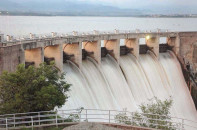Regulating cyberspace: Call for legislation on cyber security
Pakistan’s vulnerability to cyber attacks, needs for cyber security policy discussed at seminar.

Regulating cyberspace: Call for legislation on cyber security
A seminar on “Security in Cyber Space: Implications and Challenges” organised by the Center for International Strategic Studies (CISS) brought together security and foreign policy experts, policy makers and members of the legal and technical community to discuss cyber security issues.

Speaking on the legal framework that should be constituted to protect a country’s cyber space, former law minister Ahmer Bilal Soofi said there is a need for cyber laws at the domestic and international level. He, however, said that the greater threat came from non-state actors who followed no law. “Laws have to respond to new technology,” he said.
Syed Muhammad Ali of CISS said cyber capabilities of major powers to promote their political, economic and strategic interests within other states and to influence other societies have grown significantly.
National University of Science and Technology (NUST) Government and Public Policy Head of Department Dr Rifaat Hussain said after land, sea and space wars, cyberspace has now become the center of gravity. “No wars can take place without cyberspace these days.”
Cyber war is real and is happening at the speed of light, he said, adding that sending propaganda out to demoralise the enemy was an aspect of the cyber war. He said that cyberspace gives disproportionate powers to small and otherwise relatively insignificant number. “Cyber crime is cheap and doesn’t require much tools and manpower.”
Ammar Jaffri of the Pakistan Institute of ICT in Development said the internet would be available in every nook and corner of the world in the next five years and Pakistan would be vulnerable to all kinds of threats in the absence of a comprehensive cyber security policy.
NUST Assistant Professor Abdul Ghafoor stressed the need for enhancing technical resources and developing security applications to counter cyber security threat.
He added that 36 government database websites were attacked by Indian hackers in 2010, with the Election Commission of Pakistan’s website being defaced in 2013.
In order to battle cyber crime, Ghafoor said local security policies, cooperation with international security policy makers, eCrime laws, organisational cyber laws, privacy laws and data protection laws were the need of the hour.
NUST Associate Dean Dr Tugral Yamin said the internet was a dark underworld as one was vulnerable to attacks from anywhere, anytime. “It takes time to find the attacker and by the time identity is determined, it’s too late.”
Published in The Express Tribune, October 1st, 2014.



















COMMENTS
Comments are moderated and generally will be posted if they are on-topic and not abusive.
For more information, please see our Comments FAQ